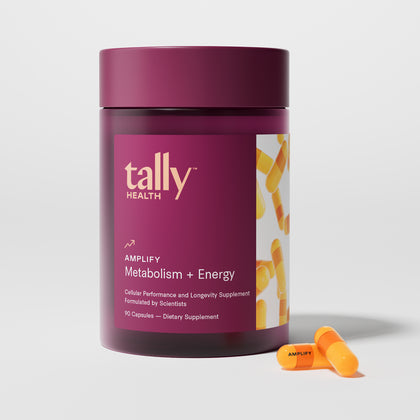

If you’ve heard of glycine, it may be as in the context of a calming amino acid used to support sleep. Glycine is a compound that plays an important role in various biological processes related to longevity, including protein synthesis, neurotransmission, and cellular health. But new science reveals it may be one of the most underappreciated players in the longevity field. Glycine not only helps regulate neurotransmission and support metabolic health, but evidence suggests that it can mimic the benefits of caloric restriction, improve autophagy, reduce inflammaging, and extend lifespan in animal models. [1, 2, 3]
One study found that higher glycine levels are associated with improved heart health and a lower risk of heart attack, highlighting its potential benefits for longevity.
And yes, you’ll find glycine in Amplify, Tally Health’s mitochondrial and metabolic support supplement, formulated to help you feel better—and age better—at the cellular level.
What is Glycine? From Collagen to Calm

Glycine is the simplest amino acid, but don’t let that fool you. It’s essential to multiple physiological functions—from building proteins and producing creatine, to regulating blood sugar, protecting mitochondria, and even influencing how our brains wind down at night. Glycine serves as a building block used to create protein in the body, working together with other amino acids such as lysine and cysteine to support essential cellular functions. [4, 5]
Found abundantly in collagen-rich foods, glycine also acts as an inhibitory neurotransmitter, giving it a naturally calming effect on the central nervous system. Important food sources of glycine include protein-rich foods, high protein foods, and dairy products, as well as other foods like meat, fish, and legumes. [6] But recently, scientists have uncovered glycine’s surprising ability to influence the biology of aging itself. Glycine, along with other amino acids, plays a vital role in supporting overall health. [1]
Glycine and Aging: Cellular cleanup, methionine, and more health benefits

As we age, our cells accumulate damage—and one of our body’s best defense mechanisms is a process called autophagy: the recycling of worn-out cellular parts. Glycine helps activate this vital mechanism, supporting healthy cellular turnover and reducing the buildup of toxic byproducts that drive aging. Glycine also exhibits anti-inflammatory effects by modulating the inflammatory response, which may further protect against age-related cell damage. [7]
Glycine also reduces levels of methionine, an amino acid linked to aging and chronic disease in animal models. Methionine restriction—whether through diet or glycine supplementation—has been shown to extend lifespan in animal models, in part by inducing autophagy and enhancing metabolic health. Research suggests that glycine may help reduce heart disease risk and cell damage, as higher glycine plasma levels are associated with a lower risk of acute myocardial infarction and ischemic stroke.
Additionally, glycine supports the immune system, contributing to overall health maintenance.
Glycine and Lifespan: The Animal Evidence

A recent review in Ageing Research Reviews uncovered compelling new animal data suggesting that glycine could meaningfully extend both healthspan and lifespan: [1]
Mice fed an 8% glycine diet lived 3.7–6.2% longer on average. [10]
Male rats lived 28.4% longer on glycine-enriched diets. [11]
In rodents, glycine prevented age-related weight gain, decreased the incidence of deaths due to lung cancer, reduced inflammation, and enhanced glucose tolerance. [10, 11]
It also improved body composition, a critical marker of metabolic and aging health. [10, 11]
One study found that ingested glycine improved insulin secretion and insulin response in animal models, suggesting potential benefits for diabetes and metabolic health.
And in a groundbreaking 2024 study in Science Advances, researchers showed that a combination of glycine and NAC (GlyNAC) reversed aging hallmarks in older adults, including improvements in mitochondrial function, oxidative stress markers, and even molecular age scores. [12] The study used a glycine supplement dosage of 1.33 mmol/kg/day, and found that ingested glycine contributed to improved insulin response and metabolic function.
Glycine and Healthspan: How Glycine promotes resilience from the inside out
Glycine offers a range of health benefits, including support for sleep quality, cognitive function, and detoxification.
Here are just a few of the systemic benefits of glycine that support healthy aging:
Reduces inflammation, especially in tissues vulnerable to age-related decline. [13]
Contributes to metabolic health by enhancing glucose control and reducing insulin resistance. [14]
Supports detoxification as a precursor to glutathione, the body’s master antioxidant, and plays a key role in liver function. [15]
Preserves muscle and connective tissue, especially when paired with collagen-rich nutrition. [16]
Calms the brain and supports deeper, more restorative sleep by modulating NMDA and glycine receptors in the brainstem and spinal cord, improving sleep quality, and supporting cognitive function and short term memory. [6, 17]
Glycine may also influence symptoms of schizophrenia by modulating neurotransmitters and hormone levels, with research suggesting potential benefits for mood, memory, and mental health.
Your Glycine Game Plan: How to boost your intake

Prioritize collagen-rich foods Bone broth, skin-on poultry, pork rinds, and gelatin-based snacks contain high levels of glycine. [18]
Supplement wisely Glycine is available as a dietary supplement, and glycine supplements can be found in capsules, powders, and other forms. Glycine supplements are generally considered safe for most people, but dosage should be individualized based on health needs and goals. Glycine doses can vary depending on the context. [17, 19] Tally Health’s Amplify includes glycine as part of its formula aimed at supporting mitochondrial and metabolic wellness. Always consult a healthcare provider before starting a new supplement, especially if you are taking medications, to ensure safety and avoid potential interactions.
Pair glycine with sleep support Try glycine 30–60 minutes before bed—it may improve sleep latency and quality. [17]
Think synergistically For potentially greater wellness effects, consider combining glycine with NAC or other mitochondrial cofactors like magnesium, alpha-lipoic acid, CoQ10, or other supplements.
Taking too much glycine can lead to adverse effects, so it is important to follow recommended dosage guidelines and consult a healthcare provider for personalized advice.
Glycine Supplements: Designed for Mitochondria. Powered by Glycine.

At Tally Health, we believe in formulating with purpose—and glycine’s aging-supportive science made it a clear choice for our Amplify supplement. Alongside clinically backed ingredients like magnesium malate and taurine, glycine helps Amplify support:
Healthy mitochondrial function
Better metabolic resilience
More efficient energy production
A calmer nervous system and better sleep
Ready to feel the difference glycine can make?
What is glycine?
Glycine is the simplest amino acid and serves as a building block for proteins in the body. It also regulates blood sugar, protects mitochondria, influences brain function, and has a calming effect on the central nervous system.
How does glycine support healthy aging?
Glycine supports healthy aging by promoting autophagy (cellular cleanup), reducing inflammation, lowering methionine levels, supporting mitochondrial function, and improving metabolic health.
Where can you find glycine in food and supplements?
Glycine is found abundantly in collagen-rich foods like bone broth, skin-on poultry, and gelatin-based snacks. It is also available as a dietary supplement and is included in Tally Health’s Amplify formula for mitochondrial and metabolic support.
Recommended Supplements
Citations
[1] Johnson AA, Cuellar TL. Glycine and aging: Evidence and mechanisms. Ageing Res Rev. 2023 Mar 31;87:101922. doi:10.1016/j.arr.2023.101922. PMID: 37004845.
[2] Wang W, Wu Z, Dai Z, et al. Glycine metabolism and its roles in metabolic diseases and cancers. Frontiers in Nutrition. 2020;7:582522. doi:10.3389/fnut.2020.582522.
[3] McCarty MF, O'Keefe JH, DiNicolantonio JJ. Dietary glycine supplementation for the treatment of low circulating glycine: A potential strategy for improving cardiometabolic health. Open Heart. 2018 Sep 26;5(2):e000895. doi:10.1136/openhrt-2018-000895. PMID: 30349692.
[4] Razak MA, et al. Therapeutic potential of glycine in the treatment of diseases related to the central nervous system. Oxid Med Cell Longev. 2017;2017:7852325. doi:10.1155/2017/7852325.
[5] Meléndez-Hevia E, de Paz-Lugo P, Cornish-Bowden A, et al. A new method for the quantitative analysis of the whole human metabolome. PLoS One. 2009 May 7;4(5):e5491. doi:10.1371/journal.pone.0005491.
[6] Kimura F, et al. Glycine as a neurotransmitter. Jpn J Pharmacol. 2003 Jun;92(2):107-13. doi:10.1254/jjp.92.107.
[7] Al-Rubaye A, et al. Glycine enhances autophagy and provides protection against oxidative stress in primary cortical neurons. Brain Res. 2022 Jul 1;1785:147926. doi:10.1016/j.brainres.2022.147926.
[8] Miller RA, et al. Methionine restriction: effects on longevity, protein homoeostasis and disease prevention. Ageing Res Rev. 2017 May;35:367-376. doi:10.1016/j.arr.2016.11.002.
[9] Poon H, et al. Glycine, an anti-aging amino acid, promotes longevity and retards aging processes in mice. J Gerontol A Biol Sci Med Sci. 2020 Feb 14;75(3):447-456. doi:10.1093/gerona/glz132.
[10] Miller RA, et al. Glycine supplementation extends lifespan in male and female mice. Aging Cell. 2019 Jun;18(3):e12918. doi:10.1111/acel.12918.
[11] Brind J, et al. The effect of glycine on age-related weight gain and glucose tolerance in male C57BL/6J mice. Age (Dordr). 2013 Aug;35(4):1199-206. doi:10.1007/s11357-012-9442-9.
[12] Kumar P, et al. GlyNAC supplementation in older adults improves aging hallmarks. Science Advances. 2024 Feb;10(2):eads1532. doi:10.1126/sciadv.ads1532.
[13] Zhong L, et al. Glycine prevents and treats inflammation and inflammatory diseases. Curr Protein Pept Sci. 2018;19(11):1083-1090. doi:10.2174/138920371911181015112151.
[14] Yan-Jiang W, et al. Glycine metabolism: implications for metabolic diseases. Nutr Metab (Lond). 2020 Jan 20;17:3. doi:10.1186/s12986-019-0418-z.
[15] Lu SC. Regulation of glutathione synthesis. Mol Aspects Med. 1999 Aug-Dec;20(3-4):237-46. doi:10.1016/s0098-2997(99)00002-8.
[16] Prockop DJ, Kivirikko KI. Collagens: molecular biology, diseases, and potentials for therapy. Annu Rev Biochem. 1995;64:403-34. doi:10.1146/ annurev.bi .64.070195.002155.
[17] Bannai M, Kawai N. New therapeutic strategy for amino acid medicine: glycine improves the quality of sleep. J Pharmacol Sci. 2012;118(2):145-8. doi:10.1254/jphs.11r04ag.
[18] Wu G. Dietary requirements of loved ones for protein and amino acids. Amino Acids. 2016 Dec;48(12):2709-2715. doi:10.1007/s00726-016-2244-9.
[19] File SE, et al. Glycine and mood disorders. Curr Top Med Chem. 2009;9(10):864-70. doi:10.2174/156802609789375302.
[20] Kennedy DO. B Vitamins and the Brain: Mechanisms, Dose and Efficacy—A Review. Nutrients. 2016 Feb 27;8(2):68. doi:10.3390/nu8020068.











